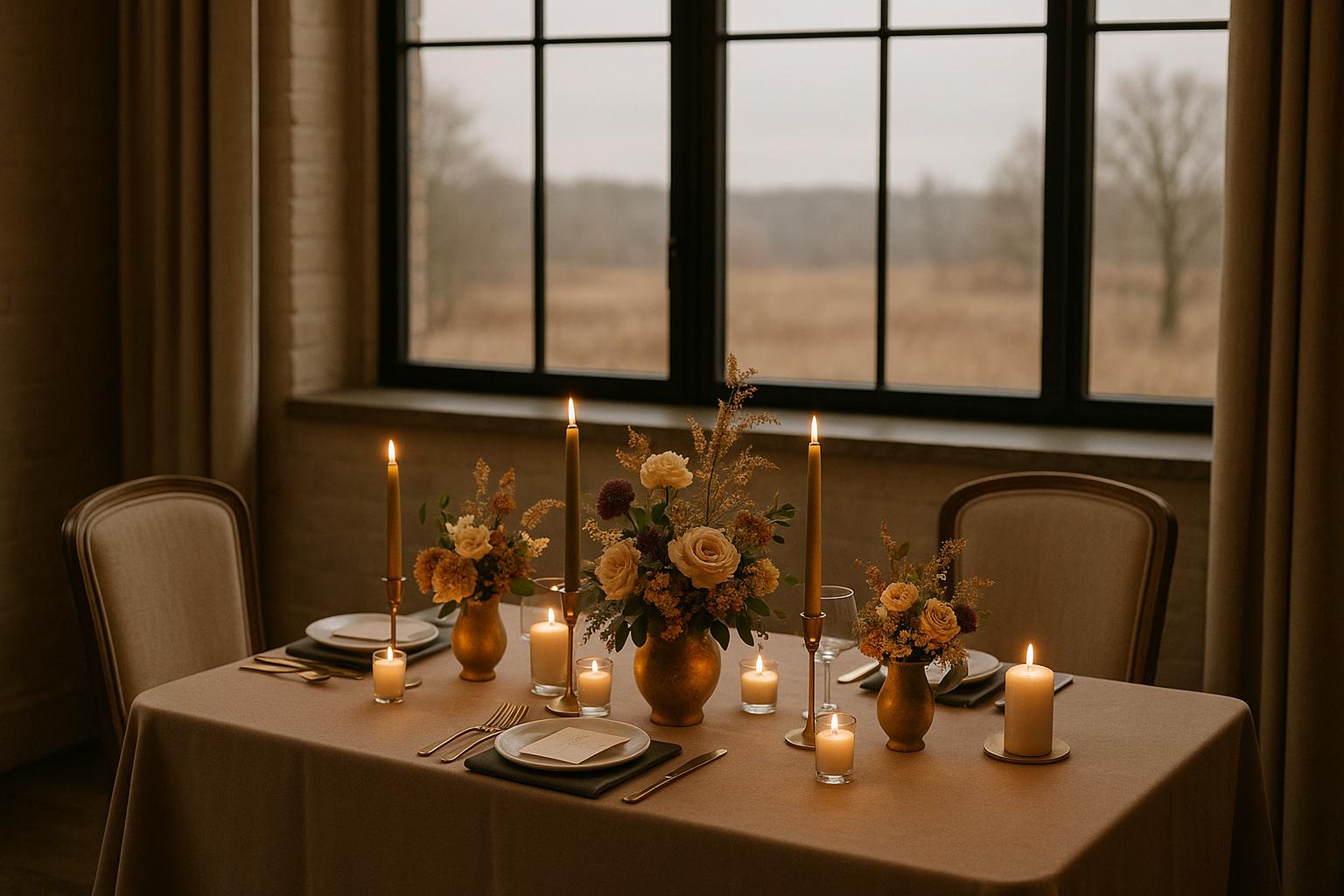
How to Plan an Off-Season Wedding Budget
How to Plan an Off-Season Wedding Budget
Planning a wedding during the off-season - typically in winter months like January and February - can save you thousands while offering better vendor availability and fewer scheduling conflicts for guests. Here's why it works and how to budget effectively:
- Lower Costs: Winter weddings are up to 9.4% cheaper, with January weddings averaging $29,900 compared to the $33,000 national average.
- Affordable Venues: Venues may offer discounts of 20-60% during off-peak months.
- Better Vendor Access: Vendors are more flexible and attentive during slower seasons.
- Guest Attendance: Fewer scheduling conflicts mean higher attendance rates.
Quick Budget Tips:
- Set a Realistic Budget: Include personal savings, monthly contributions, family support, and a 5-15% emergency buffer.
- Prioritize Spending: Allocate 40-50% for the venue, 24% for catering, and adjust for off-season discounts.
- Trim Guest List: Reducing 10 guests can significantly lower costs.
- Negotiate with Vendors: Ask for custom packages and weekday discounts.
- Track Spending: Use apps, spreadsheets, or a dedicated account to stay on budget.
| Season | Months | % of Weddings (2024) | Savings Potential |
|---|---|---|---|
| Winter (Off-Season) | December-February | 9% | 3-9.4% below average |
| Fall (Peak) | September-November | 41% | Standard pricing |
| Spring/Summer (Peak) | May-October | Variable | Standard to premium pricing |
Start planning early, focus on flexibility, and make the most of off-season perks to create an unforgettable wedding without overspending.
37 - Debunking Wedding Budget Myths
Building Your Wedding Budget
Planning a wedding, especially during the off-season, starts with setting a budget that reflects your financial reality. Here's how to structure your budget step by step.
Calculate Total Funds
Figure out how much you can comfortably spend on your wedding. While the average wedding in 2024 costs around $33,000, your budget should align with your unique financial situation.
Here are the key components to consider:
- Personal Savings: Review how much you've already saved.
- Monthly Contributions: Calculate how much you can save each month leading up to the wedding.
- Family Support: Have honest conversations with family about potential contributions.
- Emergency Buffer: Set aside 5–15% of your budget for unexpected expenses.
Once you've determined your total funds, you can start dividing the budget across different wedding expenses.
"The best way to stay on budget is to be realistic about what you are willing to pay each step of the way, from the venue to the vendors to your dress and accessories." - Kristen Gall, retail expert and President of Rakuten Rewards
List Must-Have Items
Divide your budget into categories based on your priorities. Here's a typical breakdown of wedding expenses:
| Category | Percentage of Budget | Average Cost Range |
|---|---|---|
| Venue & Rentals | 40–50% | $4,000 – $12,000 |
| Catering | 24% | $35 – $135 per person |
| Photography/Videography | 10–12% | $3,500 – $8,000 |
| Flowers & Decor | 8–10% | Varies by season |
| Music & Entertainment | 7–10% | $1,600 – $3,000+ |
| Attire & Beauty | Varies | $95 – $250 per service |
These percentages and cost ranges are based on standard pricing, but off-season discounts can help you save even more.
Guest Count and Costs
The average wedding typically includes about 100 guests, so managing your guest list wisely is crucial for staying within budget.
Tips for Managing Your Guest List:
- Around 17% of invited guests may decline.
- Split guests into two groups: "must-haves" and "nice-to-haves".
- Limit plus-ones to guests in long-term relationships.
- Set clear invitation rules, such as no children or immediate family only.
Cutting just 10 guests from your list can save you a significant amount on catering, seating, and favors.
Now that you've outlined your budget, stay tuned for practical ways to reduce costs as you continue planning your special day.
Reducing Wedding Costs
Planning a wedding during the off-season can help you save money while still creating a memorable celebration. By focusing on specific budget-friendly strategies, you can make the most of your resources without compromising on quality.
Get Better Vendor Rates
Choosing an off-season wedding date can give you an edge when negotiating with vendors. Nicole Ettenhofer, VP of Growth and Strategy for George Street Photo, explains, "Exploring non-prime or off-season wedding dates and days of the week can offer substantial savings. Some vendors offer more affordable prices during the winter and spring seasons."
Here are a few ways to negotiate effectively:
- Be upfront about your budget and ask vendors how they can work within it.
- Opt for weekday or Sunday services, as these are often less expensive than Saturdays.
- Request customized packages that better match your needs and budget.
- Always get agreements in writing to avoid misunderstandings.
Find Lower-Cost Venues
The venue is often the single biggest wedding expense, but off-season rates can make a huge difference. For example, data shows that hosting a wedding in January can save you 9.4% compared to peak months:
| Month | Cost | Savings |
|---|---|---|
| January | $29,900 | 9.4% |
| December | $30,900 | 6.4% |
| November | $31,400 | 4.8% |
George Wainwright from Coastal DJ & Video notes, "Hosting a wedding in the off-season can lead to significant savings. The off-season means fewer weddings, so many venues and vendors offer discounted rates during this time."
To save on venue costs:
- Ask about discounts of 30-50% for off-season bookings.
- Be flexible with your wedding date to secure the best rates.
- Choose venues that are well-equipped for winter weather if you're planning a colder-season wedding.
Save on Decorations
Decorations can enhance your wedding’s ambiance without breaking the bank. Cameron Forbes, a wedding planner and founder of Forbes Functions, suggests focusing on smaller projects: "Focus on smaller projects like seating cards or signage, and avoid large-scale DIY decor that could end up costing more in the long run."
Here’s a snapshot of current decoration prices:
| Item | Cost |
|---|---|
| Assorted Glass Bud Vases (set of 4) | $26 |
| Velvet Wedding Reception Table Runner | $16 |
| Watercolor Table Number Cards (25 cards) | $47 |
| Wooden Candle Holders (set of 2) | $30 |
Tips for budget-friendly decoration:
- Use seasonal elements and repurpose ceremony décor as centerpieces.
- Create layered candle centerpieces with candles of varying heights for a chic look.
- Borrow vintage items from family or friends to add charm without added cost.
"The key to saving money on your wedding is being flexible and creative. You can still have a beautiful, meaningful wedding without going overboard on spending." - Cameron Forbes
sbb-itb-309de5c
Wedding Registry Planning
A well-thought-out wedding registry can help offset costs during the off-season while ensuring you receive gifts that truly matter. By aligning your registry with your cost-saving strategies, you can make the most of your off-season wedding budget.
Using GiftList for Your Registry
GiftList simplifies managing your wedding gifts with its universal registry feature. It allows you to add items from any online store, set up cash funds for specific goals, and easily share your registry with guests via your wedding website.
Here’s a suggested timeline to keep your registry on track:
| Timeline | Registry Action |
|---|---|
| 6 months before | Create your initial registry |
| 4–5 months before | Share your registry on your wedding website |
| 2–3 months before | Add seasonal items to your list |
| Monthly | Update your registry to avoid duplicates |
"Having a thoughtfully built registry in place before any showers or engagement celebrations allows guests to choose meaningful gifts early on".
Once your registry is set up, managing it effectively will help you avoid overlaps and ensure it aligns with your needs.
Prevent Gift Overlap
Proper registry management is key to avoiding duplicate gifts and ensuring you receive items that will be useful in your new life together.
"When a couple is getting married, there's so many other things that are a priority, and the wedding registry takes a backseat... At the end of the day, it is the registry that should last them a lifetime together - but they just aren't thinking that, they're thinking about the flowers and the guest lists and the invitations and the fonts and the food selections and the cake."
"I advise couples to offer a mix of traditional gifts along with either a cash or honeymoon fund. You always have parents or other older guests that still want to buy a tangible item like a stand mixer or towels."
Striking a balance between traditional gifts and modern options, like cash funds, helps cater to all your guests while complementing your overall budget strategy.
Here are some tips for managing your registry smartly:
- Set Up Targeted Funds: Consider creating funds for specific goals, such as:
- Honeymoon experiences
- A down payment on a home
- Wedding expenses
- Donations to a charity
- Include a Range of Gift Options: Offer items across different price points to accommodate all budgets:
- Under $50
- $50–$150
- $150–$500
- $500+
- Keep Your Registry Updated Weekly: Regular updates ensure your registry stays relevant and organized:
- Remove purchased items
- Add seasonal necessities
- Adjust quantities for popular items
- Update cash fund details
"Cash registries are a great option. It's flexible for the wedding couple and it's flexible for their guests."
Managing Your Budget
Keeping an eye on your off-season wedding expenses means staying flexible and making adjustments when needed. Celebrity wedding planner Mindy Weiss advises, "It is very important to determine what your budget is very early in the process so you're not going to be disappointed when you really see the bottom line of your budget".
Budget Tracking Tools
Did you know that over half of couples go over their wedding budget? To avoid becoming part of that statistic, having the right tools to track your spending is key. Here are a few popular methods to keep your finances in check:
| Tracking Method | Best For | Key Features |
|---|---|---|
| Dedicated Apps | Digital-savvy couples | Auto-syncing, alerts, real-time tracking |
| Spreadsheets | Detail-oriented planners | Customizable, formula-based calculations |
| Separate Account | Financial organization | Clear transaction history, dedicated funds |
| Wedding Planner | Physical documentation | Receipt storage, vendor contact info |
For extra control, Mindy Weiss suggests, "I often tell my couples to open a separate checking account or a savings account for [their] wedding". Setting up spending alerts in your app or account can also help you stay on track by notifying you when you’re nearing your budget limits. Even with careful planning, surprises can pop up, so being ready to adjust quickly is essential.
Budget Changes
Unexpected expenses are almost inevitable, and being prepared to handle them can save you a lot of stress. While off-season weddings can help reduce costs overall, it’s still important to leave room in your budget for surprises. Wedding experts at Honey + Thyme recommend, "We recommend setting aside an 'emergency fund' from the start for added design elements or last-minute add-ons (guest count goes up, bad weather plan tent is activated, etc.). If you do not tap into this, you can use it to tip your vendors or put it towards your honeymoon!".
Here’s how to manage sudden changes in your budget:
- Set a Buffer: Reserve 5-10% of your total budget for unexpected costs.
- Track Every Adjustment: Keep detailed records of any changes to your budget.
- Negotiate With Vendors: If prices shift, see if vendors can work within your updated budget.
- Prioritize Essentials: Be ready to cut non-essential items if necessary.
"If you have a last-minute element to pay for and the supplier you want or need is still available, the best thing to do is to negotiate and see if they'll meet you at a price you can afford. A great planner will often handle this for you, thanks to their strong relationships with suppliers."
– Lisa Smith, Isla & Smith
When budget pressures arise, keep Mindy Weiss’s advice in mind: "Compromise, compromise, compromise".
Conclusion: Smart Off-Season Wedding Planning
Planning an off-season wedding is a savvy way to save money while still creating a celebration to remember. By timing your big day during less popular months, you can enjoy substantial discounts and added flexibility. For instance, venue rates in the winter months can be slashed by as much as 60%, and Sunday weddings alone can cut venue costs by approximately $4,000 compared to peak dates.
Here’s a quick look at how timing can impact your budget:
| Timing Strategy | Potential Savings |
|---|---|
| January/February Weddings | Up to 60% off venue prices |
| Sunday Ceremonies | Around $4,000 less on venue fees |
| Designer Trunk Shows | $150–$500 off wedding gowns |
| Sample Sales | 20–90% discounts on dresses |
Off-season weddings also give you more negotiating power with vendors. During slower months, vendors often have more availability and can focus on bringing your wedding vision to life. Opting for dates in January, February, July, or November not only lowers your costs but also helps guests save on travel, as airfare and accommodations are usually cheaper during these times.
"Venue fees can be $4,000 less, plus food and beverage minimums are lower, which is great for smaller parties"
To make the most of your wedding planning, combine these cost-saving tips with a well-thought-out registry using tools like GiftList. By being strategic and flexible, you can create a beautiful, budget-friendly wedding that everyone will cherish.
FAQs
What are some tips for negotiating with vendors to save money on an off-season wedding?
To cut costs when negotiating with vendors for an off-season wedding, start by being clear about your budget and priorities. Vendors tend to be more open to negotiation during the off-season, so letting them know you’re flexible with their availability can often lead to discounts or customized packages.
Another smart move is to consider hiring a wedding planner. Their experience and network of contacts can often open doors to better pricing and terms. Throughout the process, maintain a respectful yet firm approach, and establish clear deadlines for responses to keep things on track. Off-season weddings already come with cost-saving benefits - make the most of this timing to stretch your budget further!
How can I handle unexpected wedding costs without going over budget?
To keep your wedding budget on track while handling unexpected expenses, it’s smart to set aside an emergency fund - about 5% of your overall budget. This cushion can help cover surprises like last-minute vendor charges or extra guests.
If you can, work with a wedding planner. They often have insider tips and vendor connections that can help you save money and avoid unnecessary spending. Another way to cut costs is by reusing ceremony decor at the reception or opting for seasonal flowers, which tend to be more affordable.
You might also want to skip non-essential extras, like wedding favors, to free up funds for unexpected costs. These small tweaks can make a big difference, ensuring you stay prepared without compromising your big day.
How can I create a wedding registry that fits my off-season budget?
Creating a wedding registry on a budget during the off-season doesn't mean compromising on quality. Focus on practical items that fit your needs and take advantage of seasonal discounts. For example, home goods and kitchenware often go on sale during slower shopping periods, making them smart additions to your list.
Platforms like GiftList can make the whole process easier. With its universal wish list feature, you can pull items from any retailer, compare prices, and keep track of your spending in one convenient place. This approach not only helps you stay within budget but also simplifies things for your guests, ensuring they can easily find and purchase gifts you’ll love. By staying organized and prioritizing value, you can create a registry that’s thoughtful and wallet-friendly.


